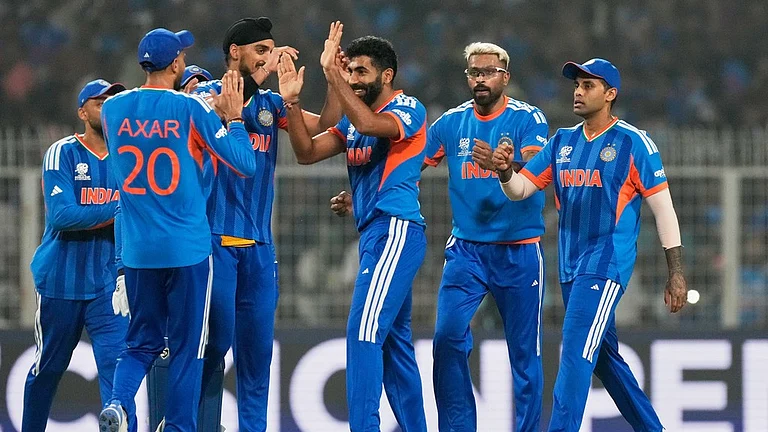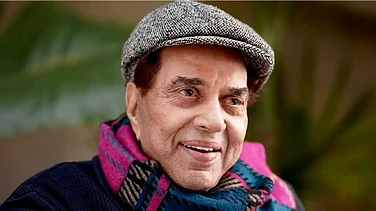Movie: Zwigato (2022)
Cast: Kapil Sharma, Shahana Goswami
Director: Nandita Das
Writers: Nandita Das, Samir Patil
“Wo majdoor hai, isliye majboor hai… Ya fir wo majboor hai, isi liye wo majdoor hai.”
The hard-hitting lines from Zwigato play in your mind as the clamour grows among gig workers seeking fair pay.
In an age where one can get their everyday needs at the tip of their fingers and blink of an eye, Nandita Das' most recent feature film Zwigato traces the lives of the people behind the food delivery apps that have become an intrinsic part of our lives. It is a story about the trials and tribulations of a certain class of society, those who earn their bread by making it to our doorsteps in 10 minutes or less. It is the story of the booming gig economy of India and the exploited lives of gig workers.
Set in Bhubaneswar, the film follows the lives of Manas Mahto and his wife Pratima. Manas (played by the ever-so-charming Kapil Sharma) is a migrant from Jharkhand who signed up as a rider for a food delivery app after having lost his job as a floor manager at a factory, while his wife (played by the extremely talented Shahana Goswami) tries her hand at a few odd jobs to make an extra earning for the house, like joining a mall as the cleaning staff, something Manas’ patriarchal roots don’t particularly approve of but he does not have the heart to restrict his wife.
“The idea of the film started during the pandemic. It made us more and more dependent on gig workers and less and less aware of their struggles. As I began to delve deeper into the subject, I was drawn to the human aspects of this collision of new technology and the life of the workers, who are just a cog in the wheel,” says filmmaker-actor Nandita Das, as she draws inspiration from Charlie Chaplin’s 1936 satire-comedy ‘Modern Times’.
The film opens in a rather bizarre dream sequence showing Manas on a never-ending train ride – what Das calls a “metaphor for the relentlessness of a life that never pauses”. From there, he suddenly ends up at the office of a ‘Sugam’ scheme, where a crowd has gathered to get their hands on the forms seeking government jobs; and then he wakes up. As Manas zig-zags through the city on his bike, his life is replete with ratings, penalties and incentives – a target of 10 deliveries he must achieve. Despite a warm family life, things go awry when his wife Pratima decides to join the mall, taking the righteous 'breadwinner' title away from Manas.

Speaking on the significance of the recurring dream sequence, that goes on to ultimately shatter Manas’ hopes, Das adds, “Our dreams are a reflection of our deepest anxieties and hopes. Somewhere in his mind, Manas believes that a more secure and better job, that often are only seen in government jobs is around the corner.”
The gig economy emerged at the birth of the 21st century but with the advent of high-speed internet, coupled with the restrictions of the pandemic, it has gone mainstream. Food and essentials delivery apps like Zomato, Swiggy, and Dunzo, which fall under this industry, have not only brought comfort to the lives of the Alpha generation but also strengthened the country’s growth.
Das observes that with the rise of the gig economy, the struggle between man and machine that Chaplin depicted in Modern Times has now shifted to one between man and algorithm. “The working class is increasingly vanishing from our collective consciousness and we see very few protagonists in mainstream cinema from this social strata,” Das says, adding that the film was “also a way to explore the many layers of our reality by simply following the daily life of a family caught up in it.”
A typical person in urban India today is spoilt for choices but even 5 years ago, it used to be limited to walking down to the kirana store next door. But what about the people breaking their backs, riding bikes in scorching summer afternoons or icy cold winter evenings to get our food served to us hot and fresh? Are they able to satiate their stomachs three times a day? Are they secure in their jobs? What does security even mean for them?
Riders across the country have staged several rounds of protests, the latest being by Blinkit delivery partners, over frequent pay cuts and lack of social security benefits like provident fund, group insurance and pension. In the film, Manas struggles to complete his deliveries on time, loses out on the Rs 15 per ride earning, faces lordly customers and ultimately leaves his job after an argument at the Zwigato office.
Among the many issues that gig workers are facing today, Das says, the biggest is the lack of adequate earnings even after working longer than what is considered full working hours, say in a factory. “On top of it, not having benefits like health insurance and other basic rights of employees is a double whammy,” she says.
Das further highlights that while companies are profit-driven, we as consumers need to understand our own complicity in the situation. “We should reflect on our growing needs for comfort and convenience and at whose expenses they are being met. These new food delivery services that guarantee delivery within 10-15 minutes create a lot of stress for the riders and safety hazards. Glad they are uniting despite the nature of their work which doesn’t allow an opportunity to do so,” she says.
Nandita Das’ social commentary etches itself out beautifully as the film illustrates a fiction with the harsh reality of millions of gig workers stitched into every frame, who are “partners” on paper but are treated with no dignity. Pratima’s excitement, on the other hand, of wearing her new uniform and venturing into the gig sector brings contrast to the hopelessness of Kapil Sharma’s character, despite the nature of her work, and his disapproval of it.
The 104-minute narrative also sheds light on the nature of the faceless organisational structure of the gig economy that is driven by algorithm-based data and that leaves workers with nowhere to go for redressal. This comes through when Manas goes to deliver 20 pizza boxes to an arrogant customer who gives false feedback resulting in blocking Manas’ user ID.
“Gulaami to yahan bhi hai, bas maalik nahi dikhta,” Manas says in another scene, outlining the false expectations that one comes to the realisation after joining the industry.
“Companies (in the gig sector) claim that they do not ‘employ’ workers who toil to deliver their service, but prefer to call them ‘partners’! The reality is that most gig workers struggle to make a decent living. In this film, the voice of the app is that invisible maalik who is always watching you and telling you what to do. But it is a one-way street, as they can never really reach their boss. While a lot of people are familiar and adept at using phones, their lack of higher education often makes it difficult for delivery riders to understand the complete technological framework and systems they have to work within,” Das notes.
On the technical front, Zwigato may be slightly sluggish with a shaky camera, a dry treatment of the good vs bad narrative and an average background score but the film gives crucial insight into what goes on behind the ease of these quick-fix apps due to inadequate employment opportunities. It paints a grim picture and realises empathy among customers for the humans behind the system who are treated like mere machines, with their mental burden and financial insecurities overwhelmingly cropping up on a daily.

















